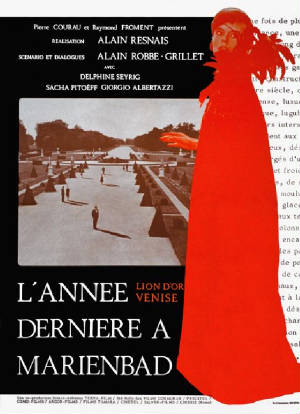|
|
 |
|

(1961, directed by Alain Resnais)
- inducted 2017 –
“This ultimate puzzle film from 1961 remains unique and incomparable in the annals of cinema. Simply put, there is nothing
quite like Last Year at Marienbad. Like Igor Stravinsky's The Rite of Spring or Michelangelo Antonioni's L'Avventura,
it arrived with controversy and elicits strong love or hate to this day. In Last Year at Marienbad, director Alain
Resnais and writer Alain Robbe-Grillet may have fashioned either the most exquisite art object in moving pictures or the most
deadpan joke of all time, and either interpretation is perfectly viable. Even the title is ironic because the characters reminiscing
do not know whether they were really in Marienbad last year.
“Shot in the Bavarian palace of Nymphenburg and the park at Schleissheim, Last Year at Marienbad is set on the
anonymous grounds of a luxurious manor populated by the idle rich, all looking as impeccably elegant as their surroundings.
As Resnais’ camera traverses the endlessly ornate extravagance, one catches fragments of enigmatic conversations. The
plot, such as it is, involves one woman (Delphine Seyrig) and two men (Giorgio Albertazzi and Sacha Pitoeff), all unnamed,
wandering the lush spaces while Francis Seyrig's organ music plays ominously.
“Representative of cinema as modern art, Last Year at Marienbad moved away from narrative and resists precise
elucidation. The viewer must work to assign meaning in the film only to find the film evades any single interpretation. The
importance is that in doing that work, the viewer realizes that truth is not absolute but depends on context, and the context
in Last Year at Marienbad is constantly changing. Fact and fiction, memory and fantasy, time and even space rearrange
themselves blurring their borders. Without context, there is no truth. In that, Marienbad points the way toward the
postmodern.
“Throughout his career, Resnais dealt with the themes of time and memory. Even this early however, space plays a major
and inextricable role as well. In Last Year at Marienbad, space, as well as time, shifts constantly – the locations
of the balcony over the garden, the garden itself, a pool, and a fountain all seem to rearrange themselves in relation to
each other throughout the movie. It's a contrast with Resnais’ previous film, Hiroshima Mon Amour. Where that
film was claustrophobic and intense, Marienbad would be open and cool. As strikingly original as it was in its time and now,
Marienbad, like any art, was not without total precedence. One could see it as an extreme refinement of Jean Cocteau's
work, and while completely different tonally, Luis Bunuel's more dreamlike surrealist moments could have been an inspiration.
Marienbad has clearly gone on to have significant impact and influence on other great filmmakers from Federico Fellini
to Stanley Kubrick and David Lynch to Peter Greenaway.”
~ George Wu
|
 |
|
Original title: L’année dernière à Marienbad
Principal cast: Delphine Seyrig, Giorgio Albertazzi, Sacha Pitoëff
Screenplay by Alain Robbe-Grillet
Produced by Pierre Courau, Anatole Dauman, Raymond Froment
Co-producer: Robert Dorfmann
Director of photography: Sacha Vierny
Production design by Jacques Saulnier
Costume design by Bernard Evein
Film editing by Jasmine Chasney, Henri Colpi
Original music by Francis Seyrig
Makeup by Alexandre Marcus, Eliane Marcus
Sound by Robert Cambrouakis, Jean-Claude Marchetti, Jean Nény, René Renault, Guy Villette
Titles designed by Jean Fouchet
France / Italy
Duration: 94 minutes
Languages: France
Filmed in black and white
Sound mix: Mono
Aspect ratio: 2.35:1 (Dyaliscope)
Produced by Cocinor, in co-production with Terra Film, Société Nouvelle des Films Cormoran, Precitel, Como-Film, Argos-Films,
Les Films Tamara, Cinétel, Silver Films, Cineriz
Released in USA by Astor Pictures Corporation
Premiered in France on 25 June 1961
USA release date: 7 March 1962
Awards and honors:
- Selected as one of Roger Ebert’s “Great Movies,” 30 May 1999
- Venice, 1961: Golden Lion (won)
- Academy Awards (USA), 1962: Best Writing, Story and Screenplay – Written Directly For the Screen (nominated)
- BAFTA Film Awards, 1962: Best Film From Any Source (nominated)
|
 |
|
|
 |
|
|
 |
|
|
|
|
|
|
 |

